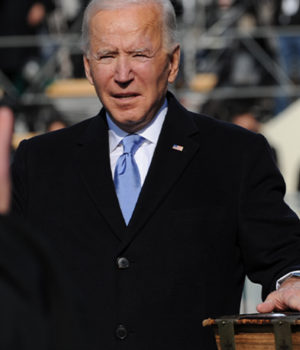Written by Joey Slusher
Since Franklin Roosevelt, the President’s first one hundred days have become a period for the new President to introduce their cabinet and impart reforms that will define the rest of their time in office. While certainly not as bad as the Great Depression, President Biden has been elected in another period of economic hardship in the United States and has therefore put forth a one hundred plan to attempt to tackle some of these hardships.
The most pressing issue, which the President and his team faces, is clearly the Pandemic which is still ravaging the US as the country has surpassed 500 thousand deaths connected to the virus. The most prominent piece of his COVID-19 plan is the goal of 100 million vaccinations by the end of his first one hundred days. This would require some 1 million vaccinations a day. As of February 24, the US has administered 65 million doses amounting to 13.4 percent of the population and is giving about 1.4 million shots a day according to NPR.
This has not gone off without a hitch, as the winter storms last week slowed the process. Millions of people from Texas to right here in Salem, saw their vaccination date pushed back due to the inclement weather and power outages it caused. This has created a slight backlog as distribution centers attempt to recover.
The President has also committed to a third stimulus check which is focused on lower income people, families, and small businesses. The plans 1,400 dollar payments will be available to a greater proportion of the public in order to give families and individuals more money to support themselves and put back into the economy. This time parents may be able to receive 1,400 dollars for each dependent on their taxes with no cap on how many they might be able to claim. That means that even college students may qualify to receive the stimulus check through our parents.
The stipulations are as follows: Individuals making 100 thousand dollars or less, Heads of Household making l50 thousand dollars or less, and couples making 200 thousand dollars or less would qualify for the plan. Overall, it would cost the country some 1.9 trillion dollars, but is an investment that would likely pay dividends toward the country’s recovery. The proposal as it stands is expected to be passed by the U.S. house by the end of this week. Despite being relatively popular with the public, the bill is likely to change in the Senate where Democratic control is more tenuous.
The President has delivered on smaller promises that he has direct power over, such as rejoining the Paris Climate Accord. His greater promises, such as an increase of the minimum wage to fifteen dollars, college debt forgiveness, immigration, and climate change have yet to be touched as they have proven to cause controversy among Republicans and members of his own party. These controversies are even affecting the confirmation of some of the President’s cabinet picks, which will also hinder the President’s progress.
For the time being, this has forced the President to stick to policies with popular support among the public and within Congress which draws more skepticism as to whether he can deliver on all of his promises by the looming one-hundred-day mark.




